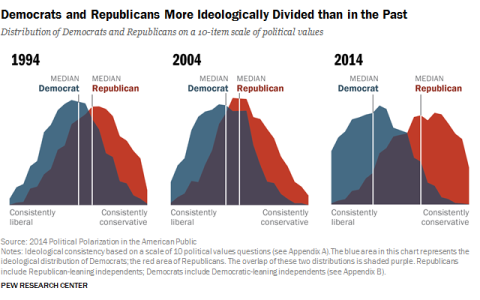The US political system is designed around one simple concept – compromise. Our constitutional republic was constructed with many checks and balances intended to keep one political party from gaining too much power. This design ensured that the USA was not a simple democracy with majority rule as the Founding Fathers feared tyranny of the majority as much as they feared tyranny of the minority.
In recent years the USA has become polarized.¹ The median view in both parties is becoming increasingly ideological which explains why we’re seeing more dysfunction in the government.
There are many theories explaining the polarization, but what’s disconcerting, in my opinion, is the lack of compromise despite this polarization. In a world of instant gratification we seem to have forgotten what Keith Richards and Mick Jagger taught us almost 50 years ago:
Our system works not because one side always gets what they want. It works because they realize that you can’t always get what you want. And if you compromise, you might find, you get what you need.³ The system of tangled checks and balances requires compromise, but you have to recognize that compromise is the key to a well functioning system. And unfortunately, we seem to be increasingly uncompromising in our views.
I am a registered independent for many reasons:
- I like to keep my options open and believe that my political views could change given differing circumstances. No one party has all the right answers at all the right times.
- Our system is constructed to ensure that there are checks and balances and I want my votes to reflect a fairly balanced perspective of the entire country’s views even though I know that I might disagree with some of those views.
When I vote in US elections I always vote for different parties across the ballot. So, if I vote for a Democratic President I will intentionally vote for Republicans in many down ballot races. For instance, this year I will probably vote exclusively for Republicans in the House to ensure that the House is controlled by the party that is most likely to win (since current odds call for a Democratic Senate and Executive). My views have an obvious ideological tilt, but just a tilt rather than a sharp uncompromising slant. I don’t do this because I agree with the oppositions views, but because I want to ensure there’s a check on my other votes. I guess you could call it a form of diversification. And we know that diversification works because owning a broader slice of the asset pool reduces variance which makes our future results more reliable.
The key here is, by ensuring that there are always checks on our representatives we require some degree of compromise knowing that we can’t always get what we want, but with compromise we can get what we need. So, the obvious problem with my approach is that it requires that our Representatives understand that our system works well when there is compromise. Sadly, I am not so certain that our representatives understand this point. I disagree with many people who think our system has become dysfunctional and needs to be completely upended. The structure of the system is as sound as it’s ever been. It’s those representatives who have forgotten the importance of compromise who have contributed to its dysfunction. So, the best the voters can do is vote knowing that the system is sound and hope that our Representatives understand the importance of compromise in solving the country’s problems.
¹ – See, “Political Polarization in the American Public” by Pew Research
² – There’s a sound argument to be made that the country would be better governed by the Rolling Stones than the current crop of representatives.
³ – See what I did there?
NB – In other news, I have just discovered rock solid empirical evidence of the best Halloween candy – the Reese’s Peanut Butter Cup. I discovered this after consuming 5 of them.
Mr. Roche is the Founder and Chief Investment Officer of Discipline Funds.Discipline Funds is a low fee financial advisory firm with a focus on helping people be more disciplined with their finances.
He is also the author of Pragmatic Capitalism: What Every Investor Needs to Understand About Money and Finance, Understanding the Modern Monetary System and Understanding Modern Portfolio Construction.


